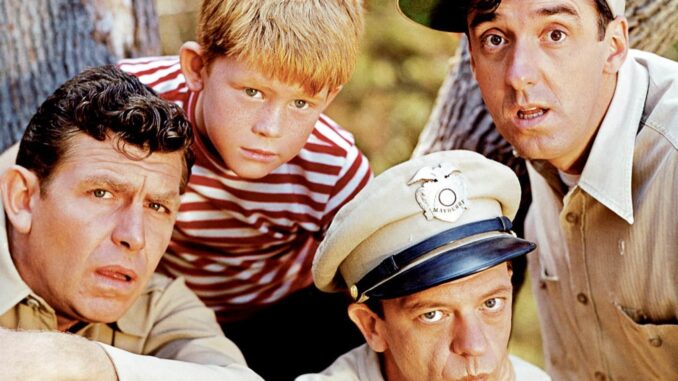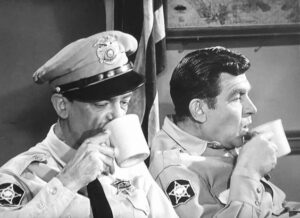
When you look back at different Classic TV shows featuring comedy duos, you’re often left wondering what it is that brings these two characters together. And that’s certainly the case with Andy Griffith’s Sheriff Andy Taylor and Don Knotts’ Deputy Sheriff Barney Fife on The Andy Griffith Show. These two couldn’t be more different from each other, yet there’s something about that combination that kept people tuned in week after week back when the show originally ran in the 1960s, and even years later in reruns.
Andy is the straight man, a folksy fellow serving the good people of Mayberry who pretty much always knows how to handle a situation, and generally keeps his cool. Barney, on the other hand, has tremendous delusions of grandeur, is filled with over-reactions, a false swagger, and often causes many of the comic mishaps that unfold on the show. Yet somehow these two men, fast friends off camera, made that relationship real and allowed us to believe in them as people, not cartoons. But the truth is, Don’s contributions to the show, and many of his other projects, including, many years later, Three’s Company, can’t be underestimated. He brought a comic energy that simply touched his costs and the audience in almost everything he did.
Born Jesse Donald Knotts on July 21, 1924, in Morgantown, WV, Don somehow managed to survive an extremely unhappy and unhealthy (both physically and emotionally) childhood, and was filled with a determination to make others laugh. Needless to say, he accomplished that, and what follows is a look back at his life and career, from his early acting days, his TV success, to making movies.

When Don was born in 1924, his mother (Elsie) was already 40 years old, which could be perceived as difficult enough, but his father (William) suffered from both schizophrenia and alcoholism, both of which led to him having a nervous breakdown from the pressures of having a baby (that would be Don). And later, he will actually threaten the young Don with a knife. In the book Andy and Don: The Making of a Friendship and Classic American TV Show, author Daniel de Vise notes that when Don was in his thirties, his mother would ask him if he remembered being a kid and his father placing a knife to him throat. throat. “Don,” he wrote, “did not. Only in therapy did the memories come flooding back. Don spent his first years living in fear of the monster on the couch. Jesse Knotts harbored a primal jealousy toward Don, the unexpected baby who drew Elise’s attention away from her bedridden husband.”
Although he had a rough childhood, Don did find some peace going to the movies with his mother. He was particularly in awe of those he felt were comic geniuses, like the slapstick comedy duo Stan Laurel and Oliver Hardy. On the radio, he was stunned by the comic timing of Jack Benny. They all turned out to be true inspirations to him.
Specifically, when he was younger, Don would appear at a variety of school and church events performing as a comedian and as a ventriloquist. He even performed at a birthday party, and when the hat went around, he found that he had amassed nearly a dollar in tips. Did this mean he was in show business? Following high school, he moved to New York City with the intention of making it in comedy, but, when things failed to click for him, he returned home and participated in West Virginia University. He will eventually (following a stint in the US Army) earn a Bachelor’s Degree in education with a minor in speech.
Following his first year of college, he enlisted in the United States Army and served during World War II from 1943 to 1946. Instead of engaging in combat, he and his dummy (named Danny “Hooch” Matador) would entertain the troops. In fact, he became a part of Stars and Gripes, a G.I. variety show, and toured the Pacific. Eventually growing tired of playing straight man to a piece of wood, Don claimed that the dummy had simply disappeared. In reality, he threw poor Hooch overboard in the South Pacific. The reasoning was that his superiors wanted to keep the act going, but he wanted to participate in comedy sketches. Solution? Lose the dummy.
Thanks to connections he made while serving in the army, Don, who had gotten married to Kathryn Metz (the first of three wives), returned to New York, but this time with a definite game plan. It began with the radio western (back in the days when people would “watch” radio since TV wasn’t prevalent yet) Bobby Benson and the B-Bar-B Riders, on which he voiced a know-it-all character named Windy Wales. He made the move to television, spending two years on the soap opera Search for Tomorrow from 1953-55 (playing a catatonic character who would only respond to his sister).
